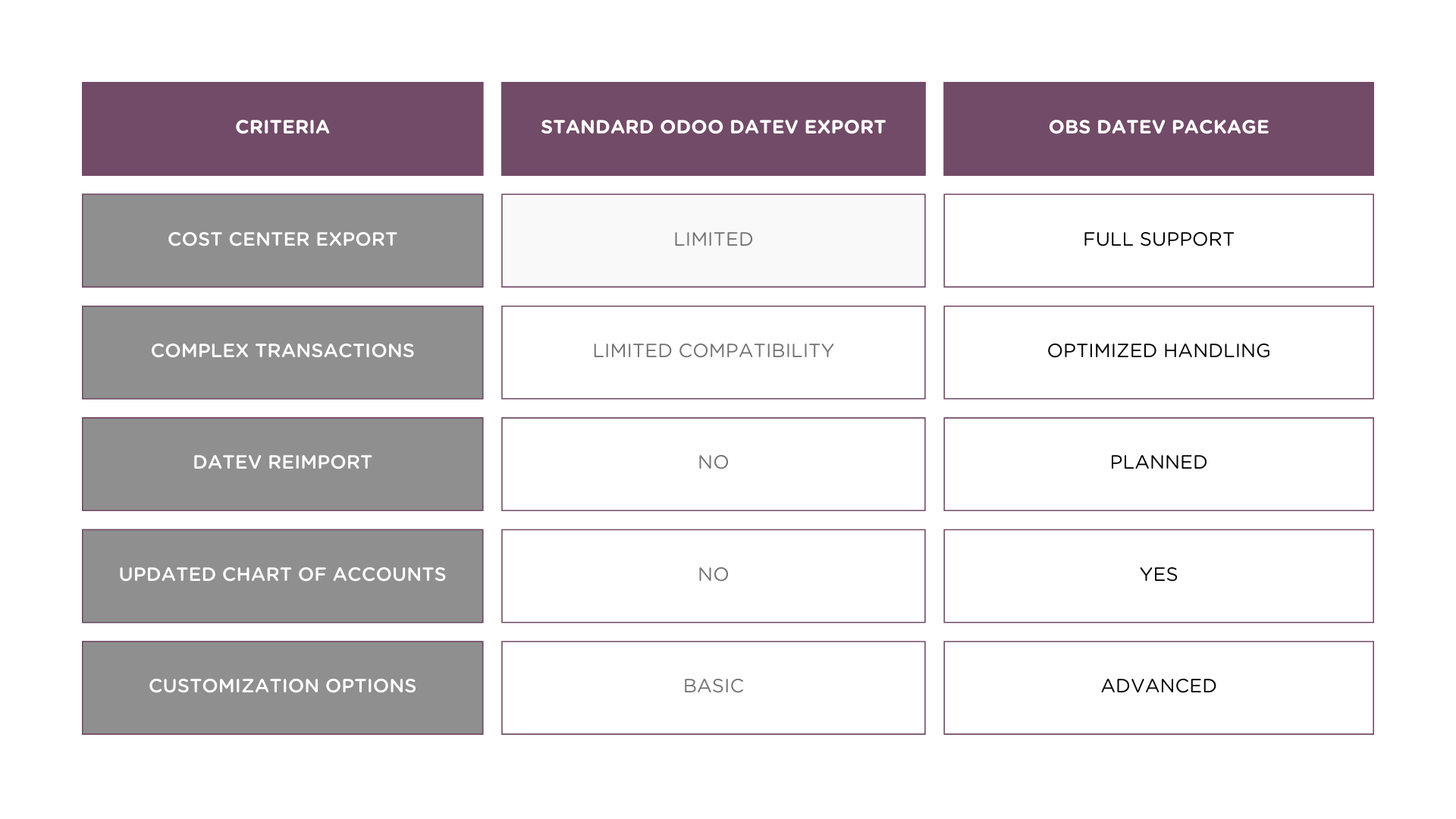Key Points at a Glance
- Odoo offers a standard export function for DATEV integration, but with limitations such as lack of reverse integration and restricted export of cost centers.
- The OBS DATEV Package enhances the DATEV integration, offering a deeper, more flexible solution with additional features.
- Key advantages of the OBS package: GoBD certification, complete cost center export, improved customization options, and updated chart of accounts.
- The OBS solution provides greater efficiency, enhanced compliance, and years of expertise.
- OBS Solutions recommends the OBS DATEV Package for businesses seeking a comprehensive and legally compliant integration between Odoo and DATEV.
Integrating Odoo with DATEV is a crucial step for many companies looking to optimize their accounting processes. While Odoo provides a standard DATEV export function, specialized solutions like the OBS DATEV Package offer extended features and seamless integration.
In this article, we compare Odoo’s standard DATEV export with the OBS DATEV solution and explain why we are convinced of its benefits.
Why Is DATEV Integration in Odoo Important?
Accounting is the backbone of any business. A transparent and efficient bookkeeping process is essential for informed decision-making, smooth operations, and regulatory compliance. With increasing digitization—such as the mandatory e-invoicing requirement—businesses must optimize and automate their financial processes.
Integrating Odoo with DATEV plays a key role in this optimization. Seamless data transfer reduces manual tasks, minimizes errors, and ensures compliance with legal requirements. While Odoo offers a basic DATEV export function, specialized solutions like the OBS DATEV Package provide enhanced capabilities. In this article, we compare Odoo’s standard DATEV export with the OBS DATEV solution and explain why OBS Solutions recommends OBS’s approach.
Odoo’s Standard DATEV Export
Odoo’s Enterprise version includes a built-in DATEV export function. This allows users to export customer and vendor master data, all journal entries, and associated documents, which can then be imported into DATEV Rechnungswesen. However, this standard export has certain limitations:
Cost centers and cost units
The export does not include KOST1 and KOST2, making cost center and cost unit analysis in DATEV more difficult.
Complex transactions
Odoo allows for more complex account assignments without requiring split bookings, which differs from DATEV’s logic and may cause export issues.
Lack of reimport functionality
Adjustments made in DATEV cannot be imported back into Odoo, potentially leading to inconsistencies.
The OBS DATEV Package
The OBS DATEV Package significantly enhances the standard Odoo export functionality, offering a deeper integration between Odoo and DATEV. Key features for export and import include:
Accounting Export
Export Your Journal Entries
Unlike many XML interfaces that only take incoming and outgoing invoices into account, this module allows you to export all journal entries created in Odoo.
Mandatory Field "Posting Indicator"
Since early 2016, the mandatory field "Festschreibungskennzeichen" (posting indicator) has become a crucial requirement for DATEV imports.
Validation of Journal Entries
With this module, Odoo can check the VAT rate for correctness before journal entries are even created.
Accounting Import
Import Your Journal Entries
Easily import your journal entries from DATEV into Odoo.
Clear Bank Transactions
When entering a bank transaction, the corresponding existing invoices are automatically marked as paid.
Cash Discount Postings
Cash discounts automatically posted in DATEV are also taken into account.
Odoo to DATEV Accounting Export – also available with DATEV XML
The export can also be combined with the DATEV-ASCII accounting import.
Outgoing and incoming invoices can be exported with detailed invoice and document information. Included in the export are all necessary receipt files required for the DATEV document import.
Advantages of OBS’s Solution Over the Standard Export
- Specialized DATEV Integration: A deeper and more precise integration with DATEV, optimized for German accounting processes.
- User-Friendliness: A simpler and more intuitive interface, particularly for users without extensive IT knowledge.
- Tailored to the German Market: Better adaptation to the fiscal and accounting requirements in Germany.
- Automation of Accounting Processes: Advanced automation features for more efficient accounting.
Comparison: Standard Export vs. OBS DATEV Package

Conclusion
While Odoo’s standard DATEV export provides basic functionality for data exchange with DATEV, the OBS DATEV Package offers a more comprehensive and flexible solution. Its additional features and OBS Solutions’ expertise make it the preferred choice for companies seeking efficient and legally compliant integration between Odoo and DATEV. The modules are offered in cooperation with Syscoon.
Want to learn more about OBS DATEV?



